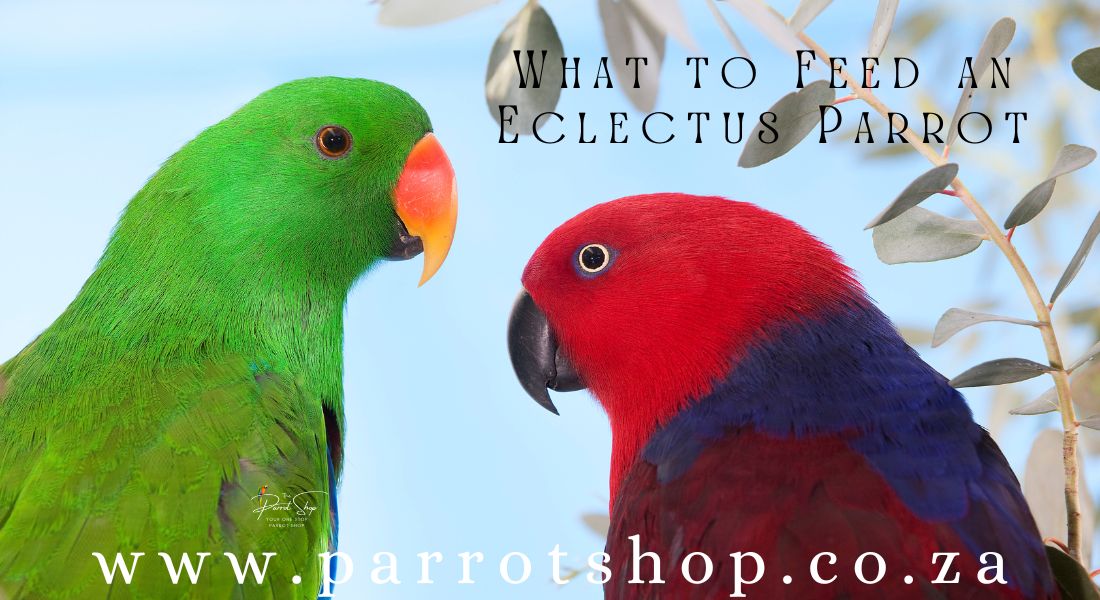Eclectus parrots are truly remarkable creatures, known for their stunning appearance and distinct dietary needs. These vibrant and colourful birds require a special diet that differs significantly from that of other parrot species, such as African Grey or Amazon parrots. In this article, we'll delve into the unique dietary requirements of Eclectus parrots, shedding light on what to feed them to ensure their health and well-being. We'll draw from scientific articles and expert opinions to provide you with a thorough understanding of their nutritional needs.
Understanding the Eclectus Parrot
Eclectus parrots (Eclectus roratus) are a captivating and unique species of parrots. One of their most intriguing features is that males and females display strikingly different plumage. In fact, for a long time, scientists believed that the male and female Eclectus parrots were separate species due to their stark visual contrast.
Another remarkable aspect of Eclectus parrots is their behaviour, particularly in the wild. Female Eclectus parrots spend up to nine months nesting in hollowed-out trees, rearing their young. During this time, multiple male suitors court and breed with the female—a phenomenon known as cooperative breeding, which is rare among birds, occurring in only 3% of bird species.
Eclectus Parrot Vital Statistics:
- Adult Size: 4 weighing 350-500 grams.
- Life Expectancy: 30 to 50 years.
Are Eclectus Parrots Good Pets?
Eclectus parrots make fantastic pets, known for their gentle temperament, affectionate nature, and relative quietness. However, it's worth noting that females can exhibit hormonal behaviours that may pose challenges in captivity due to their extended hormonal periods.
What to Feed Eclectus Parrots
Eclectus parrots are primarily herbivores and frugivores, which means they primarily consume plants and fruits, not grains. In their natural habitat, these birds forage in the rich plant life of the forest canopy, rather than on the ground. While the specific diet may vary slightly among different Eclectus parrot subspecies based on their geographical location, fig-like fruits are a preferred food source in the wild.
In captivity, Eclectus parrots need a diet that provides the right balance of nutrients to ensure their health and vitality. Most avian veterinarians recommend incorporating formulated pellets into their diet, as they offer a convenient way to ensure a balanced intake of essential nutrients. These pellets are preferred because they are free from preservatives and dyes, which are known to potentially harm Eclectus parrots.
According to Karmen Budai, an advocate of raw food diets for parrots, "A large part of the Eclectus diet should be green plants, sprouted seeds, nutritious fruits, and healthy nuts." The consensus among Eclectus enthusiasts is that these birds thrive on a rich and varied diet, coupled with high-quality pellets devoid of preservatives and dyes.
Approximately 80% of an Eclectus parrot's diet should consist of raw plant-based foods high in fiber and low in fat. Avoid supplementing their diet with artificial vitamin and mineral supplements. Instead, focus on feeding them premium pellets made using a cold press process.
Transitioning to a Plant-Based Diet
If you decide to transition your Eclectus parrot to a substantially plant-based diet, it's essential to monitor their weight closely. Start by weighing your bird weekly to ensure it's adjusting well to the dietary shift.
What Fruits and Vegetables Can Eclectus Parrots Eat?
To meet their nutritional requirements, it's crucial to provide Eclectus parrots with a wide variety of raw plant-based foods. Here are some examples:
Fruits
- Berries (rich in antioxidants)
- Apples
- Apricots
- Melons
- Cherries
- Cranberries
- Coconut
- Dates and figs
- Mango
- Palm fruit
- Peaches and pears
- Pineapple
Feed citrus fruits sparingly due to their acidic nature.
Vegetables
- Artichoke
- Bell peppers
- Broccoli
- Leafy greens
- Orange carrots
- Sweet potato
- Cauliflower
- Pumpkin seeds
- Radishes
Herbs
Herbs can be a valuable addition to your Eclectus parrot's diet, providing essential nutrients and sometimes even calming properties. Consider offering herbs like basil, cilantro, cinnamon bark, dill, mint, lavender, and more. Some herbs, such as passionflower, red clover, lavender, and lemon balm, have known calming effects and can be included to promote relaxation.
Sprouts
Soaking and sprouting legumes, nuts, and seeds can enhance their nutritional value. However, it's essential to note that certain beans, like soup-type beans, should not be sprouted and should be thoroughly cooked instead. Opt for beans such as adzuki, mung, and garbanzo when sprouting for your Eclectus parrot.
Conclusion
With proper care and attention to their dietary needs, Eclectus parrots can thrive and enjoy long, beautiful lives. By offering a diverse range of raw plant-based foods, and high-quality pellets, and avoiding artificial additives, you can ensure your feathered friend's health, disposition, and feather condition are at their best. Remember, a well-balanced and nutritious diet is the cornerstone of a happy and healthy Eclectus parrot's life


2 comments
Great article
Love this but what do I do if she throws the fruit and vegetables out of her cage